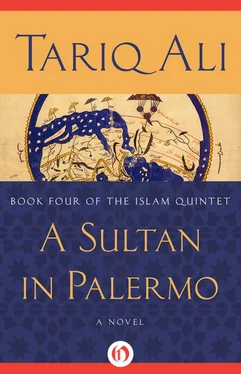The Trusted One rose and covered his shoulders with a blanket. The men were eating stale bread, dipping it in warmed olive oil flavoured with wild thyme and garlic. He went for a short walk on his own till he found a spot, close to a stream. He lifted his tunic and squatted on the ground. Allah be thanked, he could allow his bowels to move without fear of disturbance. After he had washed himself in the stream, he climbed the small hill and saw the village they were about to attack. To his men he appeared to speak with great authority, but this was the first time he had led people to fight and he knew that some of them would die. Yesterday, before the evening prayer, he had spoken to them for almost three hours to explain why they had to do what they were going to do.
His own religious beliefs were undogmatic and contradictory, a result of the numerous theological discussions and fierce debates from his years in the seminary in Cairo. Excited by the texts emanating from al-Andalus, he had abandoned his family and left for Qurtuba and then Siqilliya.
That had been twenty years ago. Soon after his arrival he had met a young woman in Noto, the daughter of a wealthy merchant, and they had loved each other, but since he had no worldly possessions the merchant had forbidden the marriage. And so she had killed herself. He had become a mystic, wandering from village to village. The merchant, mortified by what he had done, died soon afterwards of a broken heart and since the dead girl had been his only child he had left his property to the Trusted One, if only he could be found. When news reached him of this he had returned to Noto, sold the house and the merchandise and distributed the money to the poor. Then he returned to his wanderings.
Now he — without any experience of military encounters — was on the verge of a battle. He had instructed his followers to hide their weapons underneath their clothes and adopt the demeanour of crushed and broken peasants. The plan had been carefully elaborated. They left the encampment while it was still not fully light, a hundred and fifty of them, mostly riding mules, with only a dozen on horseback. The latter had special instructions. The Trusted One rode a mule at the head of the procession. Nothing could have appeared less threatening. As they reached the gates of the castle they were asked their business.
‘We are poor pilgrims,’ replied the Trusted One. ‘We used to believe in the false Prophet Muhammad, but have seen the error of our ways and wish to convert to the true faith so we can worship in church. There was none in our village so we came to the Bishop to see if he could baptise us. We have offerings for the Bishop.’
Although it was still early and most of the guards were fast asleep, they were allowed into the compound. The Bishop, on learning that his treasury was about to be enhanced and souls saved, hurriedly put on his cassock, pushed the young man in his bed aside and hurried to greet the pilgrims.
‘Which of you speaks for these men?’ he inquired.
‘Each speaks for himself,’ replied the Trusted One.
As the Bishop approached, three men grabbed him, covered his mouth and dragged him away. Seeing this, the local peasants who had remained hidden, emerged from every side with piles of wood with which they surrounded the castle. Oil was poured on the wood and soon they drew back. The castle was on fire. As they felt the heat, the Lombard mercenaries rushed out, many of them naked, but with swords in their hands. It was too late. The Trusted One led the charge and his men followed. It was a onesided battle and an unpleasant one. Not a single Lombard survived. When the castle was truly alight, the Bishop was dragged inside, and the villagers would later recall that the Trusted One stood on a wooden platform, raised his voice so all could hear and said: ‘That is for Philip al-Mahdia.’
These were the lamentable consequences of an unspoken civil war inaugurated by the trial and death of Philip that would, in the years that followed, lead to revolts in every corner of the island.
By midday the castle had become a ruin. The whole village had gathered to watch the dying blaze. Some of the women walked up to the dead Lombards and spat on them. The Trusted One understood their anger, but discouraged such acts and ordered that all the dead be given a proper burial. He had lost only six men, who were lovingly bathed, enshrouded and buried near the site of the old mosque. The village offered prayers at the funeral of the martyrs.
The half-dozen Nazarenes whose families had lived in harmony with the Muslims for two hundred years were now asked to bury their dead. At first they refused. ‘We are Siqilliyans and they are Lombards. Do not force us to bury these monsters.’
But the Trusted One said they should be buried in consecrated ground and, reluctantly, his instructions were carried out.
Beyond the hills on the low horizon, the sun was beginning to set. The villagers and the Trusted One’s soldiers were bathed in its glow. At darkness the stars appeared. The villagers lit fires in the square and celebrations began with singing and dancing. When the Trusted One arrived a sudden silence fell as they looked at him in awe. He signalled they should continue with the festivities, but a collective shyness descended on them. Instead, the villagers settled around the dying fire. They, who till early that morning had been the vanquished, were now the victors. What would happen now? A sense of expectation lit their faces and they were waiting for him to speak. Just as he was about to rise from his place, the men he had left on guard arrived, dragging a monk with them. He had seen the burnt castle and realised a rebellion had taken place, but had not seen the guards. The villagers recognised him and said he was not an outsider but had been a monk before the Church stole the land and brought the Lombards to act as its custodians. He had gone to stay with his family in Noto over a month ago.
‘What is your name, priest?’
‘Yuhanna ibn Yusef.’
‘You can see what has happened. If you are prepared to tend your flock then you should stay, but if you have thoughts of revenge, then there can be only one solution.’
‘I never liked the Lombards, but I’m sorry you had to burn the Bishop.’
The monk sat down among the villagers and was given food and wine.
The Trusted One rose to address them. He spoke simply, but explaining the history of their faith, its victories and its defeats and how so often they had lost because they had fought each other. That is how we lost Siqilliya and why we might lose al-Andalus. Then something in him decided it was time to move beyond what was already known to many of them.
‘What is never discussed openly is the greed of our Emirs and Sultans who come and take the land and enjoy its fruits without lifting a finger. Why should we work and they eat? Just a hundred years after the death of our Prophet the peasants in Persia rebelled against their landlords. There were similar uprisings in Khorasan and Azerbaijan. These were all Believers. The poor fought the rich because they argued that all were equal before Allah. The rich replied that on Judgement Day before Allah we may all be equal, but on earth as al-Quran teaches us the rich have their rights as long as they pay a tax. Allah has willed it. How could it be otherwise? And they got a rude answer from Ali ibn Muhammad in the year 169 of our own calendar. The Zanj rose in arms against the Caliph in Baghdad. I see from your faces you’re shocked. Do you know of what I speak? The Zanj were slaves from Ifriqiya who had become Believers in Allah and his Prophet. They were the poorest of the poor. Compared to them all of you are rich. They worked for the lords of the land in the watery marshlands between Baghdad and Basra. Three times the Caliphs sent armies to defeat them and three times the Zanj defeated those armies. Why? Because nothing could divide them and they had nothing to lose. For ten years they ruled themselves from the madina al-Mukhtara. Basra became their city, too. They were prepared to make peace any time provided the new system they had in place was not touched. And the rich trembled and the merchants were asked to donate more and more gold to raise an army that could destroy them. After a long siege they were defeated, but so was slavery in that form.
Читать дальше












